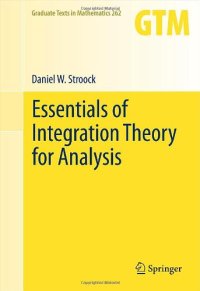
Ebook: Essentials of Integration Theory for Analysis
Author: Daniel W. Stroock (auth.)
- Tags: Analysis, Real Functions
- Series: Graduate Texts in Mathematics 262
- Year: 2011
- Publisher: Springer-Verlag New York
- Edition: 1
- Language: English
- pdf
Essentials of Integration Theory for Analysis is a substantial revision of the best-selling Birkhäuser title by the same author, A Concise Introduction to the Theory of Integration. Highlights of this new textbook for the GTM series include revisions to Chapter 1 which add a section about the rate of convergence of Riemann sums and introduces a discussion of the Euler–MacLauren formula. InChapter 2, where Lebesque’s theory is introduced, a construction of the countably additive measure is done with sufficient generality to cover both Lebesque and Bernoulli measures. Chapter 3 includes a proof of Lebesque’s differential theorem for all monotone functions and the concluding chapter has been expanded to include a proof of Carathéory’s method for constructing measures and his result is applied to the construction of the Hausdorff measures.
This new gem is appropriate as a text for a one-semester graduate course in integration theory and is complimented by the addition of several problems related to the new material. The text is also highly useful for self-study. A complete solutions manual is available for instructors who adopt the text for their courses.
Additional publications by Daniel W. Stroock: An Introduction to Markov Processes, ©2005 Springer (GTM 230), ISBN: 978-3-540-23499-9; A Concise Introduction to the Theory of Integration, © 1998 Birkhäuser Boston, ISBN: 978-0-8176-4073-6; (with S.R.S. Varadhan) Multidimensional Diffusion Processes, © 1979 Springer (Classics in Mathematics), ISBN: 978-3-540-28998-2.
‘A Concise Introduction to the Theory of Integration’ was once a best-selling Birkhäuser title which published 3 editions. This manuscript is a substantial revision of the material. Chapter one now includes a section about the rate of convergence of Riemann sums. The second chapter now covers both Lebesgue and Bernoulli measures, whose relation to one another is discussed. The third chapter now includes a proof of Lebesgue's differential theorem for all monotone functions. This is a beautiful topic which is not often covered. The treatment of surface measure and the divergence theorem in the fifth chapter has been improved. Loose ends from the discussion of the Euler-MacLauren in Chapter I are tied together in Chapter seven. Chapter eight has been expanded to include a proof of Carathéory's method for constructing measures; his result is applied to the construction of Hausdorff measures. The new material is complemented by the addition of several new problems based on that material.